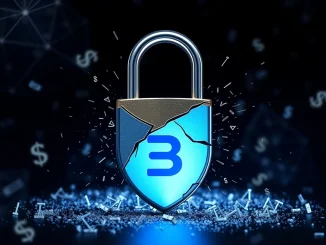
Hold onto your hats, crypto enthusiasts! The digital world is buzzing after a staggering $1.4 billion Ethereum (ETH) heist at Bybit. This isn’t just another hack; it’s a colossal event that’s sending shockwaves through the crypto community and igniting a fiery debate about the very foundations of blockchain technology. Could this be the event that triggers a contentious Ethereum Fork?
Unpacking the Shocking Bybit Hack and its Aftermath
Conor Grogan, a prominent figure as Coinbase’s Director of Product Strategy and Business Operations, dropped a bombshell on X (formerly Twitter). He declared the Bybit breach as potentially the “largest theft in history.” This isn’t just hyperbole; the sheer scale of the stolen ETH is unprecedented. According to Wu Blockchain, Grogan’s statement suggests this massive ETH theft could be the catalyst for a serious conversation about an Ethereum fork – a concept that often divides the crypto community.
Adding fuel to the fire, Arthur Hayes, the outspoken co-founder of BitMEX and current Chief Investment Officer (CIO) at Web3 venture firm Maelstrom, also weighed in on X. Hayes stated that if the Ethereum community were to consider rolling back the blockchain to recover Bybit’s pilfered funds, he would personally support such a drastic measure. This is a significant endorsement, given Hayes’ influence in the crypto space. But what exactly does an Ethereum Fork entail in this context, and why is it so controversial?
What is an Ethereum Fork and Why is it Being Discussed?
In the simplest terms, a blockchain fork is like a software update, but with a twist. It involves splitting a blockchain into two – essentially creating a new path forward. There are different types of forks, but in this context, we’re talking about a hard fork that would involve rolling back the Ethereum blockchain to a point before the hack occurred. Imagine hitting the ‘undo’ button on the entire history of transactions to erase the theft.
Here’s a breakdown to understand the gravity of the situation:
- The Scale of the Loss: $1.4 billion in ETH is not pocket change. It’s a massive amount of cryptocurrency that could significantly impact Bybit and potentially ripple through the broader ETH market.
- The Question of Immutability: Blockchain’s core principle is immutability – once a transaction is recorded, it’s permanent and cannot be altered. A rollback would directly challenge this principle, raising fundamental questions about the nature of blockchain itself.
- Community Division: Ethereum forks, especially those involving rollbacks, are highly divisive. Some argue it’s a necessary measure to protect users and the integrity of the network in extreme cases like this. Others vehemently oppose it, viewing it as a dangerous precedent that undermines decentralization and trust in the blockchain’s unchangeable record.
- Precedent Setting: If Ethereum were to roll back the chain for Bybit, it could set a precedent for future hacks. Where do we draw the line? Would every major hack warrant a rollback? This is a slippery slope that many in the crypto space are wary of.
The Thorny Debate: Blockchain Rollback – A Necessary Evil or a Dangerous Precedent?
The very idea of a blockchain rollback sparks intense debate because it clashes with the fundamental ethos of decentralization and immutability. Let’s delve into the core arguments:
Arguments for a Rollback (Pro-Fork in this Case):
- Recovering Stolen Funds: The most obvious benefit is the potential to recover the stolen $1.4 billion for Bybit and potentially its users (depending on how Bybit handles the situation). This would be a significant financial relief and could prevent a potential crisis for the exchange.
- Protecting the Ecosystem: A hack of this magnitude could damage trust in the Ethereum ecosystem and the broader crypto market. Proponents of a rollback might argue it’s a necessary intervention to demonstrate that the community can act decisively to protect itself from massive thefts.
- Moral Justification: Some may argue there’s a moral imperative to reverse a criminal act of this scale, especially if it disproportionately affects ordinary users or destabilizes a significant player in the crypto space like Bybit.
Arguments Against a Rollback (Anti-Fork in this Case):
- Undermining Immutability: As mentioned, blockchain’s immutability is a cornerstone principle. Rolling back the chain would shatter this trust. If transactions can be reversed, what does it mean for the long-term security and reliability of the blockchain?
- Centralization Concerns: The decision to rollback a blockchain is inherently centralized. Who decides when a rollback is justified? This raises concerns about potential censorship and manipulation in the future. It could shift power away from the decentralized network and towards a smaller group of decision-makers.
- Precedent and Future Expectations: A rollback could create a dangerous precedent. Future hackers might assume that if they steal enough, the chain will be rolled back, potentially incentivizing even larger attacks. It also sets an expectation that the Ethereum community will act as a safety net, potentially reducing individual responsibility for crypto security.
- Technical Complexity and Risks: Executing a hard fork of this magnitude is technically complex and carries significant risks. It could lead to unforeseen bugs, network instability, and further fragmentation of the Ethereum ecosystem.
Crypto Security Under the Spotlight: A Wake-Up Call for Exchanges and Users?
The Bybit hack serves as a stark reminder of the ever-present risks in the cryptocurrency world. While the details of the breach are still emerging, it undoubtedly throws a harsh spotlight on crypto security practices at exchanges and the importance of user vigilance.
Key Takeaways on Crypto Security:
| Security Aspect | Importance |
|---|---|
| Cold Wallets | Bybit reportedly suffered a cold wallet breach. Cold wallets, designed to store crypto offline, are considered the gold standard for security. If even cold wallets can be compromised, it raises serious questions about current security protocols. |
| Multi-Signature Security | Multi-sig wallets require multiple private keys to authorize transactions, adding an extra layer of security. Exchanges should implement robust multi-sig strategies. |
| Regular Security Audits | Independent security audits are crucial to identify vulnerabilities in exchange systems and smart contracts. These audits should be frequent and thorough. |
| User Education | Exchanges and the crypto community must prioritize user education on best security practices, including strong password management, phishing awareness, and hardware wallet usage. |
| Incident Response Plans | Exchanges need well-defined incident response plans to effectively manage and mitigate the impact of security breaches. Transparency and clear communication with users are essential during and after an incident. |
Navigating the Ethereum Fork Debate: What Happens Next?
The Ethereum Fork debate sparked by the Bybit hack is far from over. It’s a complex issue with no easy answers, touching upon the core values and technical realities of blockchain technology. Here’s what to watch for:
- Community Sentiment: Keep an eye on discussions within the Ethereum community forums, social media, and developer circles. The prevailing sentiment will heavily influence any potential decision regarding a fork.
- Ethereum Foundation Stance: The Ethereum Foundation’s position on this issue will be crucial. While they aim for decentralization, their guidance and technical expertise carry significant weight.
- Bybit’s Response: Bybit’s actions in the aftermath of the hack, including how they compensate users and enhance their security measures, will be closely scrutinized.
- Market Reaction: The price of ETH and other cryptocurrencies may fluctuate as the debate unfolds. Market sentiment will reflect the level of uncertainty and concern surrounding the potential fork.
Conclusion: A Defining Moment for Ethereum and Crypto?
The Bybit hack and the ensuing Ethereum Fork debate represent a pivotal moment for the crypto industry. It forces us to confront fundamental questions about security, immutability, decentralization, and the very nature of trust in blockchain systems. While the path forward remains uncertain, one thing is clear: this event will have lasting repercussions and shape the future of Ethereum and potentially the broader cryptocurrency landscape. The coming weeks will be critical in determining whether this shocking theft leads to a controversial fork or strengthens the resolve to bolster crypto security and uphold the core principles of blockchain technology. Stay tuned, because this story is far from over!



